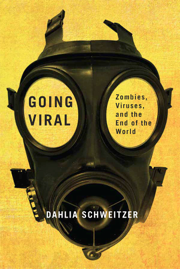
About Dahlia
DAHLIA SCHWEITZER is a pop culture critic, writer, and professor. Described by Vogue as “sexy, rebellious, and cool,” Schweitzer writes about film, television, music, gender, identity, and everything in between. She studied at Wesleyan University, lived and worked in New York City and Berlin, and completed her MA and PhD at the Art Center College of Design and UCLA. She is currently chair of the Film and Media department at the Fashion Institute of Technology in New York City.
In addition to her books, Dahlia has essays in publications including Cinema Journal, Journal of Popular Film and Television, Hyperallergic, Jump Cut, Quarterly Review of Film and Video, and The Journal of Popular Culture. She has also released several albums of electronic music, including Plastique and Original Pickup.

Professor
As a professor of film and media studies, Dahlia exposes her students to a variety of theoretical approaches and cinematic techniques, asking them to approach both with analytical inquisitiveness. Her aim is to pass her own curiosity on to her students, encouraging them to think across their classes and experiences to create intellectual connections between course materials and the world in which they live. She strives to remind her students that the loudest voice is not necessarily correct, and in so doing, helps them find their own.

Media Critic
Declared “one of the world’s leading analysts of popular culture” by renowned author Toby Miller, Dahlia writes about film, television, music, gender, identity, and everything in between. Her work can be found across mainstream, academic, and emergent channels in both long and short form. Repeatedly drawn to popular culture, Dahlia loves to analyze and unpack cultural artifacts in order to explore how they reflect social and historical issues, as well as looking at how they reinforce or interrogate common cultural assumptions.

Author
Dahlia has written numerous books exploring aspects of film and television. Regardless of the topic—serial killers, private detectives, or even zombies—all of her writing engages directly with questions of self versus other, private versus public space, examining depictions of gender, identity, and race. She traces how these depictions evolve and examines what they mean about our changing world. In her latest project, Dahlia explores the ways haunted homes have become a venue for dramatizing anxieties about family, gender, race, and economic collapse.
Blog
Pandemics, Contagion, and Fear, part 2
Over the next few days (weeks?), I will post excerpts from my book Going Viral: Zombies, Viruses, and the End of the World. Taking a look at these fictional narratives before and even during an outbreak can help us see what to do and, more important, what not to do in real life. They can also remind us—even while this all feels so scary—that we have seen this before. In the outbreak narrative, the threat always comes from the outside in, spread via physical contact, breathing, technology,...
If fear is their lifeblood, why didn’t Trump and the Republican Party embrace the Coronavirus?
Do you remember the migrant caravans? How can you not, right? You barely escaped with your life! In 2018 and 2019, Trump couldn't stop warning Americans about the large, organized caravans—full of criminals! rapists! gang members! terrorists!—that were headed straight from Mexican cities to destroy America. Trump ranted about the caravans during spring 2018, the fall 2018 midterm elections, the weeks leading up to the State of the Union, even the State of the Union itself, declaring that these...
Pandemics, Contagion, and Fear, part 1
Over the next few days, I will post excerpts from my book Going Viral: Zombies, Viruses, and the End of the World. Taking a look at these fictional narratives before and even during an outbreak can help us see what to do and, more important, what not to do in real life. They can also remind us—even while this all feels so scary—that we have seen this before. Our fears of—and fascination with—viral outbreaks have only intensified since the early 1990s as a result of several factors: one, a...




